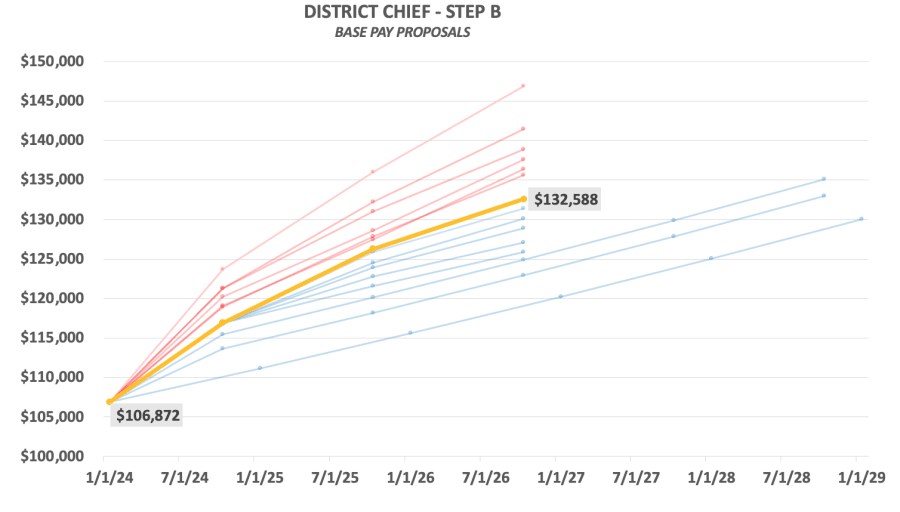SAN ANTONIO – Having negotiated since late March, bargaining teams for the City of San Antonio and the San Antonio Professional Firefighters Association shook hands on a new contract just before midnight Saturday.
The three-year contract, which was finalized after a final bargaining session that lasted 13-and-a-half hours, still needs to be approved by both the union’s membership and the San Antonio City Council before it can go into effect.
The tentative deal includes annual pay raises of 7%, 8%, and 5%. The compounding effect adds up to 21.3%.
Making the impact of those raises slightly larger, $2,400 worth of incentive pay that union members already receive will also be reclassified as part of their base pay. That means firefighters and paramedics’ base salaries will technically go up between 24.1% and 26.4%, depending on their rank.
The lowest-ranking firefighter’s salary, for example, would go from $57,576 to $72,774 by the third year while the most-senior district chief’s would rise from $106,872 to $132,588.
The deal will be the first opportunity union members have had to vote on a contract in 15 years.
The current contract was forced on both sides by a panel of arbitrators in 2020 after a years-long battle between the union and city over healthcare costs and a controversial “evergreen” clause played out at the negotiating table, in the courtroom and at the ballot box.
SAPFFA President Joe Jones, who took the helm of the union in 2022, addressed city negotiators as the talks came to a close.
“A lot of people on our side said that it couldn’t be done,” Jones said. “They said that due to historical distrust and differences that we wouldn’t be able to work together and collaborate in an effective way. And, once again, we have proven them wrong.”
The negotiating teams were in and out of the bargaining room eight different times Friday, retreating to closed-door caucus sessions for as long as four-and-a-half hours as they crafted various counter proposals.
Pay was the biggest sticking point through all 12 negotiating sessions. The city and union’s raise proposals started miles apart with the city proposing 21.7% worth of raises over five years and the union wanting 37.5% over three years.
But, over the course of 15 separate proposals - six were exchanged on Friday alone - they inched closer together. The union shaved several percentage points in its seventh and final proposal to make the final deal.
The following graphs show the effect of the various city (blue) and union (red) proposals on pay for the lowest and highest-ranking firefighters. The golden line is the final agreement.


The union has been itching to make up ground it lost in the previous fight with the city. After the final raise of their old contract in Oct. 2013, firefighters went more than seven years before the first permanent raise of their current contract. And that deal, which came out of an arbitration process the union had demanded, fell far short of what members had hoped for.
Since Oct. 2013, inflation has grown at more than three times the rate of union members’ salaries.
Jones had said throughout negotiations that the existing pay scale was putting the San Antonio Fire Department at a disadvantage to other cities. He told reporters Friday night that the new, tentative contract “puts the firefighters and paramedics on the path to health.”
“It’s not parity with (San Antonio police). It doesn’t make us the highest-paid fire department in the state. It’s none of that,” Jones said. “But it does put us on a path to health.”
The city’s lead negotiator, Deputy City Manager Maria Villagomez, called it a “good contract for our firefighters and our paramedics.”
“One of our goals was to make sure that we stay competitive,” Villagomez told reporters. “And I think this contract keeps our firefighters and paramedics as among the best paid in the state.”
The contract will cost $109.6 million over its three-year term, about $27.7 million more than what city officials had planned for when they presented the city’s FY 2025 budget proposal last week.
With the city already cutting spending to combat a growing deficit, Villagomez confirmed the new fire contract will require the city find more room in its spending plan.
“We are going to have to be making some adjustments to the budget: reducing spending, adjusting some of our potential revenues, fees,” Villagomez said.
Villagomez said city staff will lay out a proposal for council members next week on how the city can pay for the contract over the coming three years.
More related City Hall coverage on KSAT:


